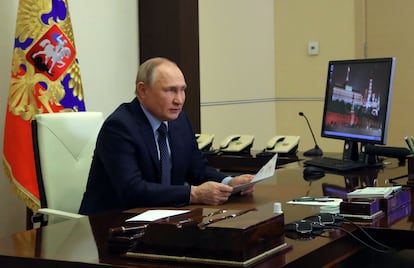Putin’s next move
The Russian president’s absolute faith in firepower is straight out of the 19th century; his way of thinking about geopolitics is so old it’s unknown to us

Would he actually do it? Is Vladimir Putin really such a nihilistic sociopath with so little regard for human life that he would use nuclear weapons against his enemies? Or is he, rather, a clever negotiator who uses the nuclear threat to extract concessions from his rivals? These are the questions that are keeping America’s diplomats, generals, and spies – as well as America’s allies – up late at night.
For decades, the doctrine of Mutually Assured Destruction (MAD) served to deter any world leader who might be tempted to use nuclear weapons. That’s because if they did, it guaranteed a retaliatory nuclear strike and, therefore, the death of hundreds of millions of people and the devastation of entire cities. There would be no winners. But now things seem to have changed.
A few days ago, Bill Burns, the respected director of the CIA, publicly acknowledged that the United States is concerned that Russia might use tactical nuclear weapons in Ukraine. Burns said that: “Given the potential desperation of President Putin and the Russian leadership, given the setbacks that they’ve faced so far, militarily, none of us can take lightly the threat posed by a potential resort to tactical nuclear weapons or a low-yield nuclear weapon.” The CIA is “watching very closely,” Burns said, though he also clarified that they have yet to detect any signs that Russia is preparing to take such a step. It is obviously worrying that the future of humanity depends on the decisions of a single person. Recognizing this, and taking into account Russia’s unacceptable behavior in Ukraine, and its equally reprehensible performance in Chechnya and Syria – it is only natural that much effort is being made to understand Vladimir Putin’s thinking.
Bill Burns, who had served as US ambassador to Russia from 2005 to 2008 and as the Deputy Secretary of State under Barack Obama, is the US official who has had the most personal interactions with Vladimir Putin. In his memoir published in 2019, Burns reveals that the most notable characteristic of the Russian leader is “his passion for control – founded on an abiding distrust of most of those around him, whether in the Russian elite or among foreign leaders.” Burns speculates that the worldview that now defines Putin’s way of thinking was nurtured both by his training as a KGB officer and by his experiences as a child and teenager on the mean streets of Leningrad in the postwar years. Putin himself has said that in this urban context “the weak get beaten up.”
Andrew Weiss is another renowned expert on Russia who as early as 2014 was decrying that “Putin is far more isolated from major foreign counterparts than at any point in his tenure. After nearly 15 years at the helm and lately at the center of the world’s attention [after annexing Crimea], Putin sees himself as a giant among weaklings who don’t measure up to him and can’t compete with him.” Eight years later, how much has Putin changed? Surely his recent military misadventures have opened his eyes to the shortcomings of his military and the surprising strengths of the Ukrainians, not to mention the resilience of the growing coalition of countries opposing him. But there are aspects of Putin’s personality that do not seem to have changed. CIA Director Burns recently said: “Putin has been stewing in a combustible combination of grievances and ambition for many years.”
It is difficult to know what Putin may be planning. But he himself has explained publicly how he thinks. We know, that his worldview comes straight out of the 19th century: an anarchic international order where the only thing that ultimately matters is military power. His enemies, meanwhile, live in the 21st century. President Zelenskiy, for one, looks more at home giving a speech at the Grammys than in a suit and tie with his own cabinet. While Zelenskiy walks around in an olive drab t-shirt, Putin clearly prefers to be seen in a business suit. Zelenskiy greets his constant visitors with relative informality in his sandbag-fortified offices, while Putin instead forces them to sit at the other end of a twenty-foot-long white table.
It’s difficult to wrap our minds around Putin’s 19th-century geopolitical thinking. The idea that the only thing that really matters is who has the most firepower is old and outdated. We’d prefer to not look at the world that way. But unfortunately, it appears that Vladimir Putin isn’t going to give us any other option.
Tu suscripción se está usando en otro dispositivo
¿Quieres añadir otro usuario a tu suscripción?
Si continúas leyendo en este dispositivo, no se podrá leer en el otro.
FlechaTu suscripción se está usando en otro dispositivo y solo puedes acceder a EL PAÍS desde un dispositivo a la vez.
Si quieres compartir tu cuenta, cambia tu suscripción a la modalidad Premium, así podrás añadir otro usuario. Cada uno accederá con su propia cuenta de email, lo que os permitirá personalizar vuestra experiencia en EL PAÍS.
¿Tienes una suscripción de empresa? Accede aquí para contratar más cuentas.
En el caso de no saber quién está usando tu cuenta, te recomendamos cambiar tu contraseña aquí.
Si decides continuar compartiendo tu cuenta, este mensaje se mostrará en tu dispositivo y en el de la otra persona que está usando tu cuenta de forma indefinida, afectando a tu experiencia de lectura. Puedes consultar aquí los términos y condiciones de la suscripción digital.









































